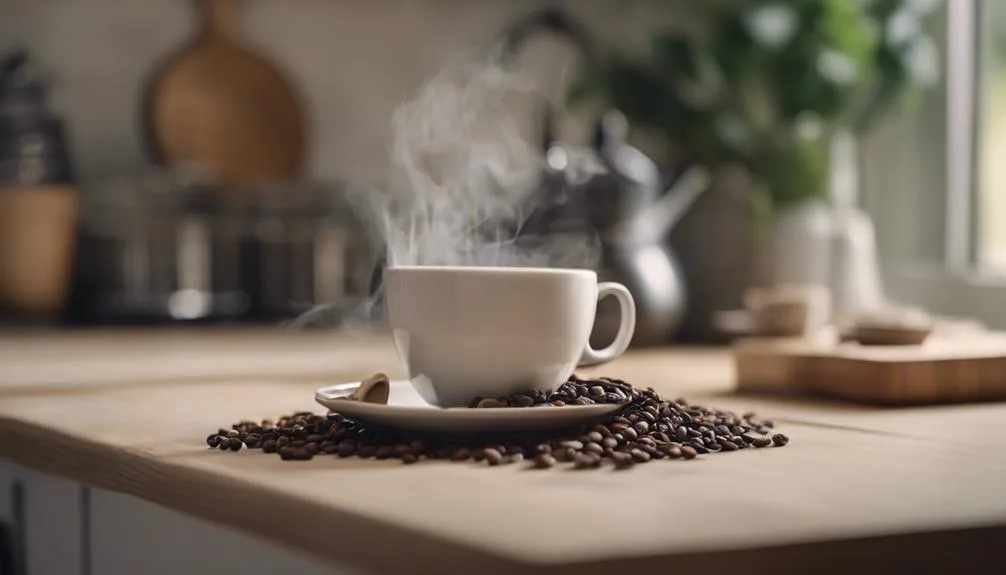Stress and anxiety stealthily seep into your life, silently setting up camp and overshadowing your daily joy. You're not alone in this fight, and the solution might be simpler and more accessible than you've imagined.
From the soothing embrace of nature to the calming effects of certain dietary choices, a world of natural remedies awaits you. Imagine a lifestyle where your wellbeing is not just a possibility but a priority, using tools that align with your body's natural rhythms.
Isn't it time you learned how to wield these tools effectively? Let's explore how you can reclaim your peace and vitality, step by natural step.
Key Takeaways
- Physical activities and outdoor exposure significantly improve mental health and reduce anxiety.
- A diet rich in Omega-3 fatty acids, B vitamins, and magnesium can help manage anxiety.
- Practicing mindfulness and stress management techniques enhances relaxation and well-being.
- Natural remedies like aromatherapy, herbal teas, and creative outlets offer effective anxiety relief.
Physical Activity Benefits
Engaging in regular physical activity can significantly improve your mental health by disrupting negative thought cycles and enhancing your overall well-being. This progress stems from the profound mind-body connection that physical activity nurtures. When you move, your body releases chemicals that not only decrease stress but also promote happiness and relaxation.
Moreover, incorporating nature therapy into your exercise routine, such as walking or yoga in a park, can amplify these benefits. The natural environment has a unique way of soothing the mind, reducing symptoms of anxiety and depression. This combination of physical activity and nature therapy acts as a powerful conduit for healing, leveraging the innate synergy between your physical and mental health to foster a state of balance and peace.
Outdoor Exposure Therapy
Outdoor exposure therapy harnesses nature's serene environment to significantly lower stress levels and improve mental well-being. By integrating nature immersion into your routine, you're not just escaping the hustle; you're actively engaging in a form of sunlight therapy that has profound effects on your mental health. Studies have shown that regular exposure to natural settings can boost mood, enhance focus, and even improve sleep quality.
- Nature immersion offers a unique way to disconnect from technology and reconnect with the earth, promoting tranquility and mindfulness.
- Sunlight therapy boosts Vitamin D levels, which plays a crucial role in mood regulation and mental health.
- Taking walks in natural settings or even spending time in your local park can significantly impact stress reduction and overall happiness.
Embracing outdoor exposure therapy can be a rewarding part of your journey to better mental health.
Nutritional Support Strategies

Incorporating a diet rich in Omega-3 fatty acids, B vitamins, magnesium, and probiotics can significantly reduce anxiety and bolster your mental health. Delving into herbal remedies exploration and making dietary adjustments are vital steps in managing your well-being. By focusing on nutrient-rich foods and natural supplements, you're equipping your body with the tools it needs to combat stress effectively.
Consider integrating foods that are abundant in vitamins and minerals into your daily meals. This approach, combined with the judicious use of natural supplements, can offer a solid foundation for mental resilience. It's not just about the food you consume; it's about nurturing your body and mind through thoughtful nutritional choices. Remember, these strategies are part of a broader spectrum of care tailored to reduce anxiety and enhance your quality of life.
Omega-3 and Mental Health
Building on the foundation of a nutrient-rich diet, let's explore how Omega-3 fatty acids play a critical role in enhancing your mental health and mitigating anxiety. Known for their profound Omega 3 benefits, these fatty acids aren't just essential for your physical well-being but are pivotal in achieving mental clarity.
- Reduce inflammation: Omega-3s help in reducing the inflammation in your brain, which can contribute to feelings of anxiety.
- Enhance brain function: They support neurotransmitter functions, leading to improved mood and cognitive abilities.
- Boost mental health: Regular consumption of Omega-3s is linked to lower levels of anxiety, providing a natural approach to managing stress.
Understanding the importance of Omega-3 in your diet can be a game-changer for your mental well-being, offering a natural path toward clarity and calm.
B Vitamins and Anxiety

Why should you consider B vitamins as a vital part of your strategy for managing anxiety? These essential nutrients play a crucial role in your nervous system's health, directly impacting your mood and stress levels. Integrating B vitamins into your diet can enhance your resilience against anxiety, providing a natural avenue toward relaxation and mental well-being.
| Nutrient | Benefits | Sources |
|---|---|---|
| B Vitamins | Reduces stress | Whole grains, eggs |
| Vitamin C | Lowers anxiety levels | Citrus fruits |
| Herbal Remedies | Promotes relaxation | Chamomile, Lavender |
While B vitamins support your body's stress response, don't overlook the power of vitamin C benefits for anxiety and the calming effects of herbal remedies for relaxation. Together, these components create a holistic approach to managing anxiety.
Supplemental Anxiety Aids
While B vitamins play a crucial role in managing anxiety, exploring supplemental aids can further enhance your mental well-being and stress resilience. Diving into the realm of natural solutions, you'll find a variety of options that cater to your unique needs and preferences.
- Herbal remedies exploration: Investigate the calming effects of herbs like chamomile and valerian root to soothe your anxious mind.
- CBD oil benefits: Embrace the potential of CBD oil for its anxiolytic properties, offering a natural alternative to traditional anxiety medications.
- Magnesium supplements: Consider magnesium for its ability to regulate neurotransmitters, promoting relaxation and stress relief.
Reducing Stimulant Intake

Cutting down on stimulants like caffeine and nicotine can significantly reduce your anxiety symptoms and improve overall mental well-being. When you lean towards a stimulant-free lifestyle, you're choosing a path toward anxiety relief that's sustainable and health-focused.
Caffeine alternatives, such as herbal teas or decaffeinated coffee, offer the warmth and ritual of your morning cup without the jittery side effects. Similarly, nicotine substitutes, including patches or gum, can ease the transition for those looking to quit, reducing anxiety triggers over time.
Embracing these changes isn't merely about eliminating substances; it's about recalibrating your body's reaction to stress. By choosing alternatives that don't spike your anxiety, you're taking a significant step towards a more balanced, serene state of mind.
Sleep Quality Improvement
Improving your sleep quality can significantly enhance your mental health and reduce anxiety levels, offering a foundational strategy for stress management. Prioritizing sleep isn't just about getting enough hours; it's about ensuring those hours are restful and rejuvenating.
Here's how you can make that happen:
- Establish calming bedtime routines that signal your body it's time to wind down. This could include reading, a warm bath, or gentle stretching.
- Stick to consistent sleep and wake times every day, even on weekends, to regulate your body's internal clock.
- Practice good sleep hygiene by keeping your bedroom cool, dark, and quiet, and reserve your bed for sleep and intimacy only.
Mindfulness and Meditation

Mindfulness and meditation have been scientifically proven to significantly reduce stress and anxiety by fostering a state of relaxation and increased self-awareness. These methods offer a tranquil escape from the chaos of your daily life, grounding you in the present moment.
Mindfulness practices encourage you to observe your thoughts and feelings without judgment, helping you understand and manage your emotional responses more effectively. Similarly, meditation techniques, such as focused attention or loving-kindness meditation, cultivate a sense of peace and connection to oneself and others.
Creative Outlets for Stress
Exploring creative outlets, such as journaling, painting, or playing music, can significantly alleviate stress and foster emotional resilience. When you immerse yourself in creative activities, you're not just passing time; you're engaging in therapeutic practices that have been shown to lower anxiety levels and improve overall mental health.
- Journaling: A safe space for expressing thoughts and emotions, reducing inner turmoil.
- Art Therapy: Utilizes the creative process of making art to improve a person's physical, mental, and emotional well-being.
- Music Therapy: Involves either playing or listening to music to manage stress, enhance mood, and encourage emotional expression.
These methods don't just offer temporary relief but can be integral parts of a strategy for long-term mental health maintenance.
Frequently Asked Questions
Can Certain Weather Conditions Affect the Effectiveness of Outdoor Exposure Therapy for Anxiety?**
Yes, seasonal effects and weather phobias can impact outdoor exposure therapy's success for anxiety. Harsh conditions may limit activities, while fears intensify stress, underscoring the need for adaptable strategies in your mental health journey.
How Do Fluctuations in Daily Light Exposure Impact Our Mental Health and Anxiety Levels?**
Fluctuations in daily light exposure can significantly impact your mental health by affecting sleep patterns and hormonal balance, leading to increased anxiety levels. It's crucial to seek balanced light exposure for well-being.
Is There a Genetic Predisposition That Affects How Individuals Respond to Natural Remedies and Supplements for Anxiety?**
Yes, genetic predisposition can affect how you respond to natural remedies and supplements for anxiety. Genetic testing may reveal variations in supplement bioavailability, guiding personalized approaches to managing anxiety with compassion and evidence-based recommendations.
Can the Integration of Technology, Such as Virtual Reality (Vr), Enhance the Effectiveness of Mindfulness Practices for Those With Severe Anxiety?**
Integrating VR can significantly enhance mindfulness practices for severe anxiety by improving accessibility and user immersion. This technology allows you to deeply engage in therapeutic scenarios, potentially leading to more effective anxiety management.
How Do Cultural Differences Influence the Acceptance and Efficacy of Natural Remedies and Creative Outlets in Managing Stress and Anxiety?**
Cultural differences can make or break the acceptance of natural remedies and creative outlets for stress. Cultural stigma and traditional beliefs play roles, but evidence-based, compassionate approaches can bridge gaps and foster understanding.
Conclusion
In summary, embracing nature's bounty and adopting mindful practices can significantly alleviate your anxiety and stress.
By integrating physical activity, nutritional wisdom, and natural supplements into your daily routine, you're not just surviving; you're thriving.
Let the fresh air, nutritious foods, and creativity be your allies in this journey.
Remember, it's the small, consistent changes that forge the path to a calmer, more centered you.
Start today, and let nature's healing power guide you to peace and well-being.

